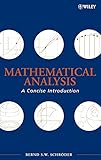Mathematical analysis : a concise introduction / Bernd S.W. Schröder.
Material type: TextPublication details: Hoboken, N.J. : Wiley-Interscience, c2008Description: xv, 562 p. : ill. ; 25 cmISBN: 9780470107966 (cloth); 0470107960 (cloth)Subject(s): Mathematical analysisLOC classification: QA300 | .S376 2008
TextPublication details: Hoboken, N.J. : Wiley-Interscience, c2008Description: xv, 562 p. : ill. ; 25 cmISBN: 9780470107966 (cloth); 0470107960 (cloth)Subject(s): Mathematical analysisLOC classification: QA300 | .S376 2008| Item type | Current library | Call number | Status | Date due | Barcode | Item holds |
|---|---|---|---|---|---|---|
 BOOK
BOOK
|
UNIMY PJ Library | QA300 .S376 2008 (Browse shelf (Opens below)) | Available | 100604 |
Includes bibliographical references (p. 551-552) and index.
Table of contents -- Preface -- pt. 1. Analysis of functions of a single real variable -- 1. The real numbers -- 1.1. Field axioms -- 1.2. Order axioms -- 1.3. Lowest upper and greatest lower bounds -- 1.4. Natural numbers, integers, and rational numbers -- 1.5. Recursion, induction, summations, and products -- 2. Sequences of real numbers -- 2.1. Limits -- 2.2. Limit laws -- 2.3. Cauchy sequences -- 2.4. Bounded sequences -- 2.5. Infinite limits -- 3. Continuous functions -- 3.1. Limits of functions -- 3.2. Limit laws -- 3.3. One-sided limits and infinite limits -- 3.4. Continuity -- 3.5. Properties of continuous functions -- 3.6. Limits at infinity -- 4. Differentiable functions -- 4.1. Differentiability -- 4.2. Differentiation rules -- 4.3. Rolle's theorem and the mean value theorem -- 5. The Riemann integral 1 -- 5.1. Riemann sums and the integral -- 5.2. Uniform continuity and integrability of continuous functions -- 5.3. The fundamental theorem of calculus -- 5.4. The Darboux integral --
6. Series of real numbers 1 -- 6.1. Series as a vehicle to define infinite sums -- 6.2. Absolute convergence and unconditional convergence -- 7. Some set theory -- 7.1. The algebra of sets -- 7.2. Countable sets -- 7.3. Uncountable sets -- 8. The Riemann integral 2 -- 8.1. Outer Lebesgue measure -- 8.2. Lebesgue's criterion for Riemann integrability -- 8.3. More integral theorems -- 8.4. Improper Riemann integrals -- 9. The Lebesgue integral -- 9.1. Outer Lebesgue measure -- 9.2. Lebesgue measurable sets -- 9.2. Lebesgue measurable functions -- 9.3. Lebesgue integration -- 9.4. Lebesgue integrals versus Riemann integrals-- 10. Series of real numbers 2 -- 10.1. Limits superior and inferior -- 10.2. The root test and the ratio test -- 10.3. Power series -- 11. Sequences of functions -- 11.1. Notions of convergence -- 11.2. Uniform convergence -- 12. Transcendental functions -- 12.1. The exponential function -- 12.2. Sine and cosine -- 12.3. L'Hôpital's rule -- 13. Numerical methods -- 13.1. Approximation with Taylor polynomials -- 13.2. Newton's method -- 13.3. Numerical integration --
pt. 2. Analysis in abstract spaces -- 14. Integration on measure spaces -- 14.1. Measure spaces -- 14.2. Outer measures -- 14.3. Measurable functions -- 14.4. Integration of measurable functions -- 14.5. Monotone and dominated convergence -- 14.6. Convergence in mean, in measure, and almost everywhere -- 14.7. Product [sigma]-algebras -- 14.8. Product measures and Fubini's theorem -- 15. The abstract venues for analysis -- 15.1. Abstraction 1 : Vector spaces -- 15.2. Representation of elements : bases and dimension -- 15.3. Identification of spaces : isomorphism -- 15.4. Abstraction 2 : inner product spaces -- 15.5. Nicer representations : orthonormal sets -- 15.6. Abstraction 3 : normed spaces -- 15.7. Abstraction 4 : metric spaces -- 15.8. L[superscript]p spaces -- 15.9. Another number field : complex numbers -- 16. The topology of metric spaces -- 16.1. Convergence of sequences -- 16.2. Completeness -- 16.3. Continuous functions -- 16.4. Open and closed sets -- 16.5. Compactness -- 16.6. The normed topology of R[superscript]d -- 16.7. Dense subspaces -- 16.8. Connectedness -- 16.9. Locally compact spaces --
17. Differentiation in normed spaces -- 17.1. Continuous linear functions -- 17.2. Matrix representation of linear functions -- 17.3. Differentiability -- 17.4. The mean value theorem -- 17.5. How partial derivatives fit in -- 17.6. Multilinear functions (tensors) -- 17.7. Higher derivatives -- 17.8. The implicit function theorem -- 18. Measure, topology and differentiation -- 18.1. Lebesgue measurable sets in R[superscript]d -- 18.2. C[infinity] and approximation of integrable functions -- 18.3. Tensor algebra and determinants -- 18.4. Multidimensional substitution -- 19. Manifolds and integral theorems -- 19.1. Manifolds -- 19.2. Tangent spaces and differentiable functions -- 19.3. Differential forms, integrals over the unit cube -- 19.4. k-forms and integrals over k-chains -- 19.5. Integration on manifolds -- g 19.6. Stokes' theorem -- 20. Hilbert spaces -- 20.1. Orthonormal bases -- 20.2. Fourier series -- 20.3. The Riesz representation theorem --
pt. 3. Applied analysis -- 21. Physics background -- 21.1. Harmonic oscillators -- 21.2. Heat and diffusion -- 21.3. Separation of variables, Fourier series, and ordinary differential equations -- 21.4. Maxwell's equations -- 21.5. The Navier Stokes equation for the conservation of mass -- 22. Ordinary differential equations -- 22.1. Banach space valued differential equations -- 22.2. An existence and uniqueness theorem -- 22.3. Linear differential equations -- 23. The finite element method -- 23.1. Ritz-Galerkin approximation -- 23.2. Weakly differentiable functions -- 23.3. Sobolev spaces -- 23.4. Elliptic differential operators -- 23.5. Finite elements -- Conclusions and outlook -- Appendices -- A. Logic -- A.1. Statements -- A.2. Negations -- B. Set theory -- B.1. The Zermelo-Fraenkel axioms -- B.2. Relations and functions -- C. Natural numbers, integers, and rational numbers -- C.1. The natural numbers -- C.2. The integers -- C.3. The rational numbers -- Bibliography -- Index.


There are no comments on this title.